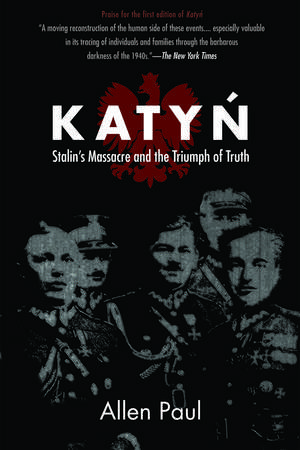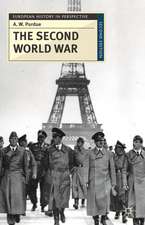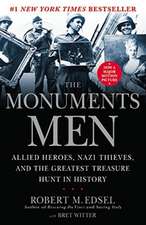Katyn: Stalin’s Massacre and the Triumph of Truth
Autor Allen Paulen Limba Engleză Paperback – 14 mar 2010
Twenty years ago, Allen Paul wrote the first post-communist account of one of the greatest but least-known tragedies of the 20th century: Stalin’s annihilation of Poland’s officer corps and massive deportation of so-called “bourgeoisie elements” to Siberia. Today, these brutal events are symbolized by one word, Katyn—a crime that still bitterly divides Poles and Russians. Paul’s richly updated account covers Russian attempts to recant their admission of guilt for the murders in Katyn Forest and includes recently translated documents from Russian military archives, eyewitness accounts of two perpetrators, and secret official minutes published here for the first time that confirm that U.S. government cover-up of the crime continued long after the war ended.
Paul’s masterful narrative recreates what daily life was like for three Polish families amid momentous events of World War II—from the treacherous Nazi-Soviet invasion in 1939 to a rigged election in 1947 that sealed Poland’s doom. The patriarch of each family was among the Polish officers personally ordered by Stalin to be shot. One of the families suffered daily repression under the German General Government. Like thousands of other Poles, two of the families were deported to Siberia, where they nearly died from forced labor, starvation, and neglect. Through painstaking research, the author reconstructs the lives of these families including such stories as a miraculous escape on the last transport of Poles leaving Russia and a mother’s daring ski trek over the Carpathian Mountains to rescue a daughter she had not seen in six years. At the heart of the drama is the Poles’ uncommon belief in “victory in defeat”—that their struggles made them strong and that freedom and independence, inevitably, would be regained.
Preț: 148.45 lei
Nou
Puncte Express: 223
Preț estimativ în valută:
28.41€ • 29.74$ • 23.50£
28.41€ • 29.74$ • 23.50£
Carte disponibilă
Livrare economică 15-29 martie
Preluare comenzi: 021 569.72.76
Specificații
ISBN-13: 9780875806341
ISBN-10: 0875806341
Pagini: 430
Ilustrații: 5
Dimensiuni: 152 x 229 x 36 mm
Greutate: 0.66 kg
Ediția:1
Editura: Northern Illinois University Press
Colecția Northern Illinois University Press
ISBN-10: 0875806341
Pagini: 430
Ilustrații: 5
Dimensiuni: 152 x 229 x 36 mm
Greutate: 0.66 kg
Ediția:1
Editura: Northern Illinois University Press
Colecția Northern Illinois University Press
Recenzii
Praise from the first edition of Katyn
“A moving reconstruction of the human side of these events … the volume is especially valuable in its tracing of individuals and families through the barbarous darkness of the 1940s.”—The New York Times
“A moving reconstruction of the human side of these events … the volume is especially valuable in its tracing of individuals and families through the barbarous darkness of the 1940s.”—The New York Times
"Not only a riveting human drama but a powerful historical exposé."—Zbigniew Brzezinski, former U.S. national security adviser
"Allen has given us the complete story of Katyn . a wonderful companion to my film!"—Andrzej Wajda, Academy Award-winning Director of Katyn
"Poles everywhere fell in love with this book . twice a bestseller in Poland."—Malgorzata Maruszkin, Publisher–Non-Fiction, Bertelsmann/Poland
"Allen has given us the complete story of Katyn . a wonderful companion to my film!"—Andrzej Wajda, Academy Award-winning Director of Katyn
"Poles everywhere fell in love with this book . twice a bestseller in Poland."—Malgorzata Maruszkin, Publisher–Non-Fiction, Bertelsmann/Poland
“A moving reconstruction of the human side of these events … the volume is especially valuable in its tracing of individuals and families through the barbarous darkness of the 1940s.”—The New York Times
“Paul marshals an impressive array of research gathered from unpublished documents, monographs and interviews to support his interpretations. The detailed personal experiences of three Polish families woven through the text transform what otherwise would be a standard historical narrative into a poignant testimony to the remarkable capacity of human beings to endure tyranny in its most inhumane form.”—The Washington Post
“As Allen Paul makes plain in his often moving history of the Katyn massacres, Stalin’s execution order was a deliberate attempt to eliminate the Polish educated classes and clear the ground for eventual Soviet dominance of the country.”—TheNew York Review of Books
“Allen Paul has thoroughly researched the murders, but more important, he has laid bare the massive coverup of the murders and of the Soviet guilt—a coverup that appears to have involved Roosevelt and Churchill, as well as Stalin.”—The Boston Globe
“Vividly written, intensely personal and passionately anti-Soviet.”—St. Louis Post-Dispatch
“A masterful chronicle … Paul tenaciously tracks and Katyn cover-up and its festering repercussions.”—Publisher’s Weekly
“Powerful examination. Well researched and ably written: a fine and harrowing study.”—Kirkus Reviews
“Engrossing. Powerfully written and filled with intriguing detail. A compelling human drama and a tribute to the unconquerable nature of the Polish people and nation.”—Buffalo News
“A formidable undertaking … well crafted and easy to read.”—The Polish Review
Notă biografică
Allen Paul is a former Associated Press reporter and political speechwriter. In April 2009, the President of Poland awarded Allen Paul the Order of Merit for Katyn.
Descriere
Twenty years ago, Allen Paul wrote the first post-communist account of one of the greatest but least-known tragedies of the 20th century: Stalin’s annihilation of Poland’s officer corps and massive deportation of so-called “bourgeoisie elements” to Siberia. Today, these brutal events are symbolized by one word, Katyn—a crime that still bitterly divides Poles and Russians. Paul’s richly updated account covers Russian attempts to recant their admission of guilt for the murders in Katyn Forest and includes recently translated documents from Russian military archives, eyewitness accounts of two perpetrators, and secret official minutes published here for the first time that confirm that U.S. government cover-up of the crime continued long after the war ended.
Paul’s masterful narrative recreates what daily life was like for three Polish families amid momentous events of World War II—from the treacherous Nazi-Soviet invasion in 1939 to a rigged election in 1947 that sealed Poland’s doom. The patriarch of each family was among the Polish officers personally ordered by Stalin to be shot. One of the families suffered daily repression under the German General Government. Like thousands of other Poles, two of the families were deported to Siberia, where they nearly died from forced labor, starvation, and neglect. Through painstaking research, the author reconstructs the lives of these families including such stories as a miraculous escape on the last transport of Poles leaving Russia and a mother’s daring ski trek over the Carpathian Mountains to rescue a daughter she had not seen in six years. At the heart of the drama is the Poles’ uncommon belief in “victory in defeat”—that their struggles made them strong and that freedom and independence, inevitably, would be regained.





